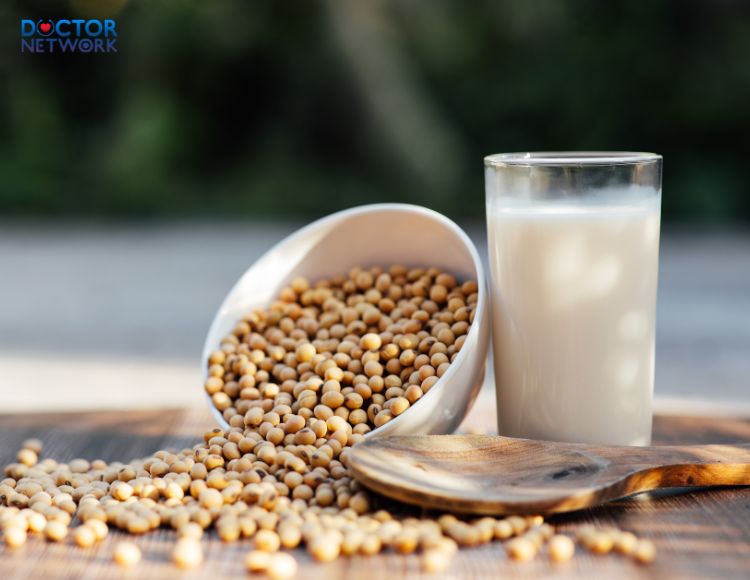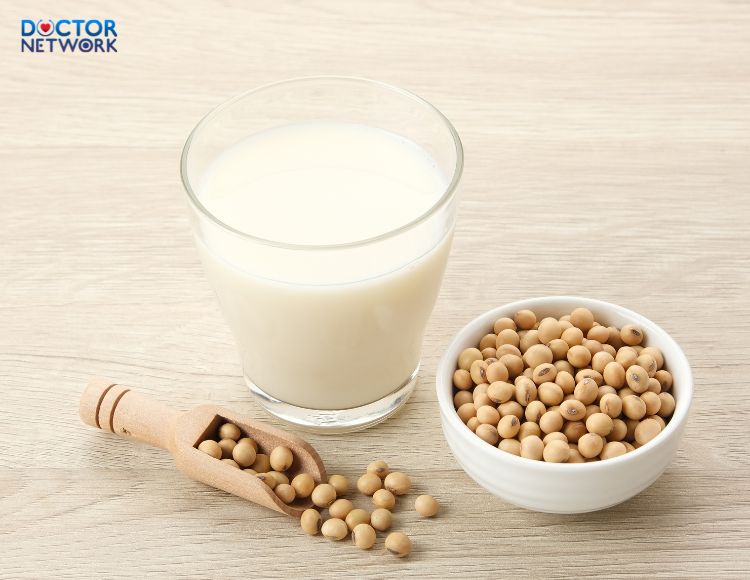Soy milk, a plant-based beverage derived from soybeans, has surged in popularity as a dairy alternative. This creamy, nutrient-rich drink is favored by those with lactose intolerance, milk allergies, or who follow a vegan lifestyle. However, as its consumption increases, many wonder: Is drinking a lot of soy milk good? In this article, we will explore the potential benefits and risks of consuming large amounts of soy milk, examining its nutritional profile, health impacts, and guidelines for safe consumption.
The Nutritional Powerhouse: Soy Milk’s Benefits
Soy milk packs a nutritional punch, offering a range of essential nutrients that contribute to overall health and well-being.
Protein-Rich and Nutrient-Dense
Soy milk stands out as a protein powerhouse among plant-based milk alternatives. A single cup (240ml) of unsweetened soy milk typically contains:
| Nutrient | Amount | % Daily Value |
|---|---|---|
| Protein | 7g | 14% |
| Calcium | 300mg | 23% |
| Vitamin D | 2.7µg | 13% |
| Iron | 1mg | 6% |
This protein content supports muscle growth, promotes satiety, and contributes to overall health. The calcium and vitamin D fortification in most commercial soy milk brands supports bone health, while iron aids in oxygen transport throughout the body.

Soy milk provides many essential nutrients for the body
Isoflavones: Nature’s Health Boosters
Soy milk contains unique compounds called isoflavones, which are plant-based molecules that can mimic estrogen in the body. These powerful phytoestrogens offer several potential health benefits:
- Menopausal Symptom Relief: May reduce hot flashes and night sweats
- Bone Health: Potential to increase bone density and reduce fracture risk
- Heart Health: Possible reduction in LDL (bad) cholesterol levels
- Cancer Prevention: Some studies suggest a protective effect against certain cancers, though more research is needed
Versatile Alternative for Special Diets
Soy milk serves as an excellent option for various dietary needs:
- Lactose intolerant individuals
- Those with milk allergies
- Vegans and vegetarians seeking plant-based protein sources
- People looking to reduce their saturated fat intake

Children should consult a doctor about dosage
Potential Risks: The Other Side of the Soy Story
While soy milk offers numerous benefits, consuming large quantities may pose some risks for certain individuals.
Anti-Nutrients and Mineral Absorption
Soybeans contain compounds called phytates, which can interfere with the absorption of certain minerals:
- Iron
- Zinc
- Calcium
To minimize this effect, consider:
- Consuming soy milk with vitamin C-rich foods to enhance iron absorption
- Choosing fermented soy products, which have lower phytate content
- Spacing out soy milk consumption from mineral supplements
Allergies and Sensitivities
Soy is one of the eight most common food allergens. Symptoms of soy allergy may include:
- Hives or itching
- Digestive discomfort
- Difficulty breathing (in severe cases)
If you suspect a soy allergy, consult an allergist for proper diagnosis and management.
Hormonal Considerations
The isoflavones in soy milk, while beneficial for some, may raise concerns for others:
- Men: Some studies suggest high soy intake might affect testosterone levels or fertility, though evidence is mixed
- Women: While soy may offer benefits during menopause, those with a history of hormone-sensitive cancers should consult their healthcare provider
GMO Concerns
Many soybeans are genetically modified. While no definitive evidence suggests GMO soy is harmful, some consumers prefer to avoid it. Opt for organic or non-GMO labeled soy milk if this is a concern for you.

Consulting a nutritionist will help you optimize the benefits of soy milk in your diet.
Finding the Right Balance: How Much Soy Milk is Too Much?
Determining the ideal amount of soy milk to consume depends on various factors, including age, health status, and overall diet. While there’s no one-size-fits-all recommendation, here are some guidelines to consider:
- Moderation is Key: Aim for 1-2 servings of soy products per day
- Variety Matters: Include a range of plant-based proteins in your diet, not just soy
- Listen to Your Body: Pay attention to how you feel after consuming soy milk and adjust accordingly
- Consult a Professional: For personalized advice, speak with a registered dietitian or healthcare provider
Frequently Asked Questions about “Is drinking a lot of soy milk good?”
How much soy milk is safe to drink daily?
The safe amount of soy milk varies by individual, but most health experts recommend consuming 1-2 servings of soy products per day. For soy milk, this translates to about 1-2 cups (240-480ml) daily. The Food and Drug Administration (FDA) suggests that 25 grams of soy protein per day may reduce the risk of heart disease. However, it’s essential to consider your overall diet and any pre-existing health conditions when determining your ideal intake.
Can drinking too much soy milk affect hormone levels?
Soy milk contains isoflavones, which are phytoestrogens that can mimic estrogen in the body. While moderate consumption is generally considered safe, excessive intake might potentially influence hormone levels. Some studies suggest that very high isoflavone intake could affect testosterone levels in men or impact women with hormone-sensitive conditions. However, research results are mixed, and effects can vary by individual. If you have concerns about hormonal health, consult an endocrinologist for personalized advice.
Does soy milk interfere with nutrient absorption?
Soy milk contains compounds called phytates, which can potentially interfere with the absorption of certain minerals like iron, zinc, and calcium. To minimize this effect:
- Consume vitamin C-rich foods with soy milk to enhance iron absorption
- Choose calcium-fortified soy milk
- Space out soy milk consumption from mineral supplements
- Consider consuming fermented soy products, which have lower phytate content
Remember, a balanced diet with a variety of nutrient sources can help ensure adequate mineral intake.
Is organic soy milk healthier than conventional soy milk?
Organic soy milk is produced from soybeans grown without synthetic pesticides or genetic modification. While both organic and conventional soy milk can be nutritious, organic options may appeal to those concerned about pesticide residues or GMOs. The USDA Organic seal ensures the product meets organic standards. Nutritionally, organic and conventional soy milk are similar, but organic varieties may have slightly different taste profiles due to production methods.
Can drinking lots of soy milk help with weight management?
Soy milk can be part of a healthy weight management plan due to its protein content, which promotes satiety. A cup of unsweetened soy milk typically contains about 80-90 calories, 7 grams of protein, and 4 grams of carbohydrates. The protein in soy milk can help you feel full longer, potentially reducing overall calorie intake. However, for weight management:
- Choose unsweetened varieties to avoid added sugars
- Consider soy milk as part of a balanced diet, not a magic solution
- Pair soy milk consumption with regular physical activity for best results
Always consult a registered dietitian or nutritionist for personalized advice on incorporating soy milk into a weight management plan
Conclusion: Sipping Wisely
Soy milk can be a nutritious addition to a balanced diet for many people. Its protein content, calcium fortification, and potential health benefits make it an attractive option for those seeking a dairy alternative. However, as with any food, moderation is crucial. By being aware of potential risks and listening to your body, you can enjoy the benefits of soy milk while minimizing any potential downsides.
Remember, individual needs vary, and what works for one person may not be ideal for another. If you have concerns about incorporating soy milk into your diet, especially in large quantities, consult with a healthcare professional for personalized guidance.
Scientific Researches
Here are some notable scientific studies related to soy milk consumption and its health effects:
- “Soy isoflavones and risk of cancer recurrence in a cohort of breast cancer survivors: the Life After Cancer Epidemiology study” by Caan et al. (2011), published in Breast Cancer Research and Treatment.
- “Soy food intake and breast cancer survival” by Shu et al. (2009), published in the Journal of the American Medical Association.
- “Effect of soy protein containing isoflavones on cognitive function, bone mineral density, and plasma lipids in postmenopausal women: a randomized controlled trial” by Kreijkamp-Kaspers et al. (2004), published in the Journal of the American Medical Association.
Reference:
Is it good for women to drink a lot of soy milk? – Vinmecvinmec·1
Is drinking a lot of soy milk good?vinmec·2
Kiểm Duyệt Nội Dung
More than 10 years of marketing communications experience in the medical and health field.
Successfully deployed marketing communication activities, content development and social networking channels for hospital partners, clinics, doctors and medical professionals across the country.
More than 6 years of experience in organizing and producing leading prestigious medical programs in Vietnam, in collaboration with Ho Chi Minh City Television (HTV). Typical programs include Nhật Ký Blouse Trắng, Bác Sĩ Nói Gì, Alo Bác Sĩ Nghe, Nhật Ký Hạnh Phúc, Vui Khỏe Cùng Con, Bác Sỹ Mẹ, v.v.
Comprehensive cooperation with hundreds of hospitals and clinics, thousands of doctors and medical experts to join hands in building a medical content and service platform on the Doctor Network application.

























